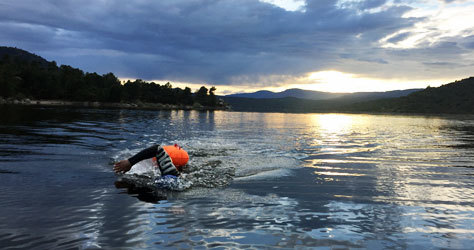- Nature: the town with the cleanest air in Europe is in Spain
- Ranking from the Algarve to Croatia: the safest destinations in Europe against the coronavirus
He is a man of records. He first walked around the world for three years (2013-2016). And then he insisted on doing it by swimming linking the five continents through the oceans . Test passed with its own name: Nemo Expedition . On both occasions, the Spanish Nacho Dean (Málaga, 1980) became the first person on the planet to achieve such feats .
The last is told in his book The Call of the Oceans (Zenith publishing house), with which he aims to raise awareness about the need to conserve the seas . We speak with this naturalist, explorer, professional adventurer and finalist for the Princess of Asturias Award for Concord in 2015 for his book, but also about sharks, crocodiles, travel, suitcases, challenges ...
How did you come up with the idea of swimming across the five continents? I walked around the world to document climate change and could see with my own eyes the amount of garbage and plastics that are flooding beaches and coastlines. We live on a planet where more than 70% of the surface is water. Every day we hear news about plastic pollution, the loss of biodiversity due to overexploitation of fishing , the rise in sea level due to global warming ... However, the sea is the great forgotten to the point that Planet Earth we should call it Planet Water . He owed the oceans. With the Nemo Expedition I wanted to join the five continents by swimming to launch a message of conservation of the oceans. What was the riskiest moment of the adventure? And the one you remember most fondly? The fourth crossing, which led me to join Asia and Oceania swimming from Mabo (Papua) to Wutung (Papua New-Guinea), a crossing in the Bismarck Sea of 22 kilometers with sharks, crocodiles and the dangerous Irukandji jellyfish. When I got to the border, after a jellyfish stung me in the face, they told me from the support boats that they had made a mistake, that the border was 12 kilometers away. I was very tired and considered giving up. Then a member of my team and my girlfriend jumped out of the boat to swim with me. That gesture of camaraderie and teamwork gave me the strength to keep going. Compared to walking around the world, was doing it by swimming more complicated? Although walking around the world was an unusual feat, I was not a swimmer. Water is a very different medium. Everything I knew about mountains, survival or camping was of no use to me. It was like starting from scratch. I had to swim more than 2,500 kilometers during more than a year of training. In addition, with the Nemo Expedition we have crossed politically and geostrategically sensitive regions. Obtaining filming permits was difficult, and his adventurous spirit was awakened at the age of five by watching a Hercules movie. What did you feel then? My passion for adventure and my love for nature come since I was little and I owe it to my parents, who took me camping in the mountains, left me adventure books and have always instilled in me the spirit of improvement ... finishing that movie I was so impressed that I said to my mother: "Mom, if you want you can call me Hercules . "According to the criteria of The Trust Project
Know more- tourism
- Environment
This is the fabulous ascent to Etna, the largest active volcano in Europe
The new hotel less hotel in Barcelona is shaped like a house and is the place to be seen this summer
The Spanish golf paradise is in Gerona (and it has its own vineyards)
See links of interest
- News
- Translator
- Programming
- Calendar
- Horoscope
- Classification
- Films
- Cut notes
- Topics

